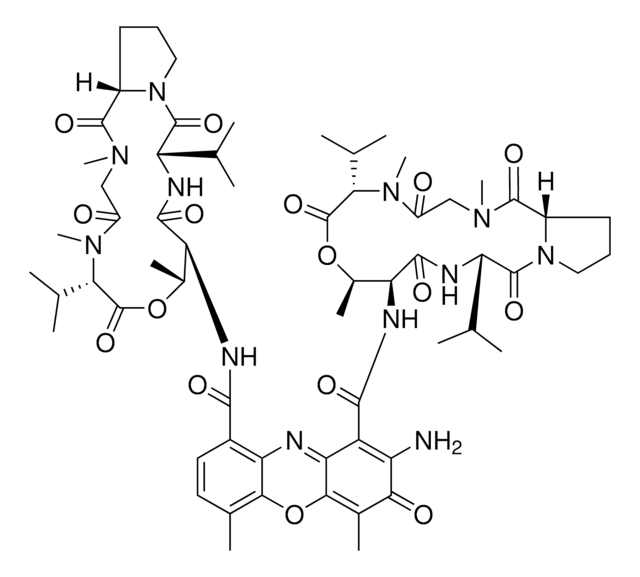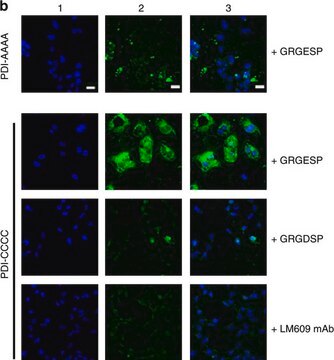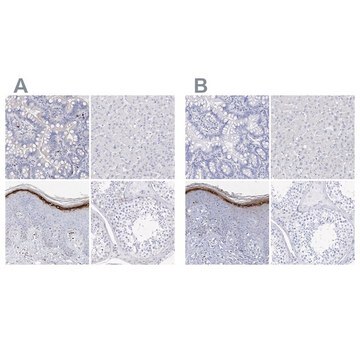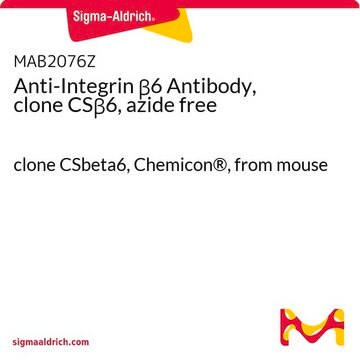General description
We are committed to bringing you greener alternative products, which adhere to one or more of The 12 Principles of Green Chemistry.This antibody is Preservative-free, produced without the harm or sacrifice of animals and exceptionally stable to allow for ambient shipping and storage if needed and thus aligns with "Waste Prevention", "Designing Safer Chemicals" and "Design for Energy Efficiency".
Click here for more information.
ZooMAb antibodies represent an entirely new generation of recombinant monoclonal antibodies.
Each ZooMAb antibody is manufactured using our proprietary recombinant expression system, purified to homogeneity, and precisely dispensed to produce robust and highly reproducible lot-to-lot consistency. Only top-performing clones are released for use by researchers. Each antibody is validated for high specificity and affinity across multiple applications, including its most commonly used application. ZooMAb antibodies are reliably available and ready to ship when you need them.
Learn more about ZooMAb here.Specificity
Clone EM13309 is a ZooMAb rabbit recombinant monoclonal antibody that specifically detects integrin alphaV beta8. It targets an epitope within the extracellular domain.
Immunogen
Recombinant fragment corresponding to amino acids 31-987 of integrin alphaV and 43-684 of integrin beta8.
Application
Anti-Integrin alphaV beta8, clone EM13309 ZooMAb, Cat. No. ZRB1192, is a recombinant Rabbit monoclonal antibody that specifically targets human Integrin alphaV beta8 and has been tested for use in Flow Cytometry, Immunocytochemistry, and Immunohistochemistry (Paraffin).
Immunohistochemistry (Paraffin) Analysis: A 1:100 dilution from a representative lot detected Integrin alphaV beta8 in human placenta tissue sections.
Flow Cytometry Analysis: 1 μg from a representative lot detected Integrin alphaV beta8 in one million HT29 cells.
Immunocytochemistry Analysis: A 1:100 dilution from a representative lot detected Integrin alphaV beta8 in HT-29 cells.
Note: Actual optimal working dilutions must be determined by the end user as specimens and experimental conditions may vary.
Target description
Integrin alphaV beta8 (UniProt: P06756/ P26012; also known as Fibronectin receptor) are encoded by the ITGAV:ITGB8 genes (Gene ID: 3685/369) in human. Integrins are heterodimeric cell surface receptors composed of a variable alpha subunit and a conserved beta subunit. The exact combination of various alpha and beta subunits dictates the binding specificity of integrins to different ECM components. Integrins are not constitutively active. Activation of an integrin from low ligand-binding affinity state to high ligand-binding affinity state requires conformational change that can originate from either from their cytoplasmic or extracellular interactions. Integrin alphaV, a single-pass membrane protein, heterodimerizes with a beta subunit. The exact combination of various alpha and beta subunits dictates the binding specificity of integrins to different ECM components. Although both subunits are required for adhesion, the binding specificity primarily depends on the extracellular region of the alpha subunit. AlphaV associates with various beta subunits in a non-covalent manner. The structural and functional diversity of the integrin family are based upon the pairing abilities of the individual alpha and beta subunits. The alphaV is synthesized with a signal peptide (aa 1-30), which is subsequently cleaved off to generate the mature form. The mature form contains an extracellular domain (aa 31-992), a transmembrane domain (aa 993-1016), and a cytoplasmic domain (aa 1017-1048). Integrin beta8 is synthesized with a signal peptide (aa 1-42), which is cleaved off to produce the mature form that contains an extracellular domain (aa 43-684), a short transmembrane domain (aa 685-704), and a cytoplasmic domain (aa 705-769). Integrin alphaV beta8 (ITGAV:ITGB8) serves as a receptor for fibronectin. It recognizes the sequence R-G-D in its ligand. Clone EM13309 is shown to bind to alpha-V beta-8 with high affinity (EC50 = 10 ng/mL). It is shown to stain a subset of tumor cell lines, including ovarian carcinomas (Ovcar3; Igrov1; SKOV3) and some melanomas. This ZooMAb recombinant monoclonal antibody, generated by our propriety technology, offers significantly enhanced specificity, affinity, reproducibility, and stability over conventional monoclonals. (Ref.: Goodman, SL et al., (2012). Biol. Open. 1(4):329-340).
Physical form
Purified recombinant rabbit monoclonal antibody IgG, lyophilized in PBS with 5% Trehalose, normal appearance a coarse or translucent resin. Contains no biocide or preservatives, such as azide, or any animal by-products. Larger pack sizes provided as multiples of 25 μL.
Reconstitution
300 μg/mL after reconstitution at 25 μL. Please refer to guidance on suggested starting dilutions and/or titers per application and sample type.
Storage and Stability
Recommend storage of lyophilized product at 2-8°C; Before reconstitution, micro-centrifuge vials briefly to spin down material to bottom of the vial; Reconstitute each vial by adding 25 μL of filtered lab grade water or PBS; Reconstituted antibodies can be stored at 2-8°C, or -20°C for long term storage. Avoid repeated freeze-thaws.
Legal Information
ZooMAb is a registered trademark of Merck KGaA, Darmstadt, Germany
Disclaimer
Unless otherwise stated in our catalog or other company documentation accompanying the product(s), our products are intended for research use only and are not to be used for any other purpose, which includes but is not limited to, unauthorized commercial uses, in vitro diagnostic uses, ex vivo or in vivo therapeutic uses or any type of consumption or application to humans or animals.






